Mohammad Sajjad salutes the memory of Mushirul Hasan -- historian, thinker, academic, institution builder, -- who passed into the ages this week.
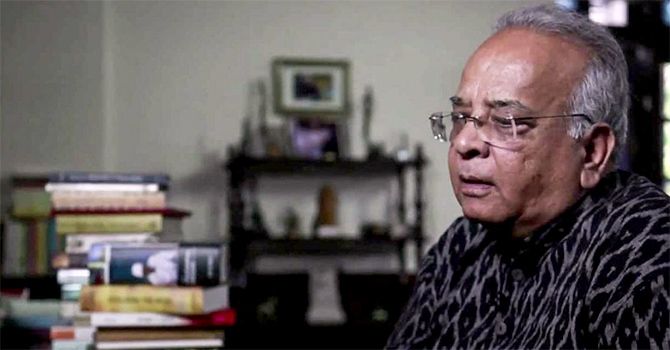
Ever since Mushirul Hasan suffered a road accident in 2014, he just could not fully recover from it.
His kidney was already on dialysis.
This multiple critical illness took him away this week, and the world of historical scholarship had lost yet another doyen.
Beyond history and academics, he first hit the headlines in April 1992 when he bravely spoke out against the ban on Salman Rushdie's novel, Satanic Verses, though he had reservations about the novel's content.
He was then pro vice-chancellor (1992-1996) of Jamia Millia Islamia, New Delhi.
Muslim reactionaries, incited possibly by a powerful politician, with deeply entrenched clout in JMI, hounded him out of the campus.
He later articulated his anguish in the preface to his book Legacy of a Divided Nation: India's Muslims since Independence (1997).
He laced his beautiful English prose with Urdu couplets in both his academic as well as popular writings.
He did this in an era when historical writing was increasingly trapped by jargon and abstractions, to be understood only by a handful of academics.
This style should be held as one of the factors why myth and concoctions have begun to replace historical truths in popular spaces.
It thereby helped right wing propaganda.
Mushirul Hasan treaded a completely different path, against the prevailing academic fad.
Another significant contribution by Mushirul Hasan to Indian historiography is the extensive and intensive use of Urdu language sources (life-writings, news-periodicals, as well as poetry, fiction and literary criticism) for writing the histories of colonial and post independence India.
He did not confirm to the Marxist, subaltern or neo-Marxist schools.
He simply delved into the primary evidences, made meticulous analysis of these and articulated in a lucid-story-telling ways.
While his books would be going through publications, he would keep introducing its important aspects through his columns, mostly in The Indian Express and The Hindu, besides his interventions in television discussions.
Very few accomplished historians have been so very comfortable in all three domains.
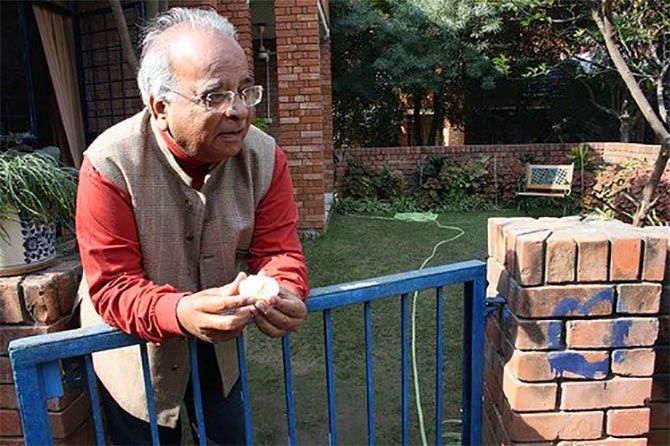
His father Mohibbul Hasan was a historian, teaching at Calcutta University, and known more particularly for his book on Haider Ali and Tipu Sultan, the rulers of 18th century Mysore.
Mushirul Hasan spent the first seven years of his life in Calcutta's Anglo-Indian locality of Ripon Street.
From Calcutta University, his father came to Aligarh Muslim University.
Mushirul Hasan therefore joined the STS High School (Minto Circle) where its popular history teacher and principal Syed Mohammad Tonki inspired him not only in history but also in debates, dramas and cricket.
With Tonki's mentoring, Mushir turned passionate about these curricular and extra-curricular activities.
He did his BA (history) and MA (medieval Indian history) in 1969 from Aligarh Muslim University where he earned quite a reputation as a distinguished debator.
When his father left Aligarh to join Jamia Millia Islamia, Mushirul Hasan went to Delhi to join as a lecturer, first in Ram Lal Anand College, and then Ramjas College.
While teaching Ideas and Institutions, he somehow felt that he must study Modern Indian History.
So he quit his job, joined Cambridge University, and obtained a PhD degree in Modern Indian History in 1977. His thesis, exploring the questions of nationalism and communal politics during 1885-1930, became immensely popular on publication and ran into many editions, with revisions and expansions, as till then Muslims were talked about in Modern Indian History without adequately looking into Urdu sources.
Mushirul then joined Jamia Millia Islamia where he rose to become professor at a rather young age.
He was steadfast in his institutional loyalty to Jamia Millia Islamia and his alma mater, Aligarh Muslim University.
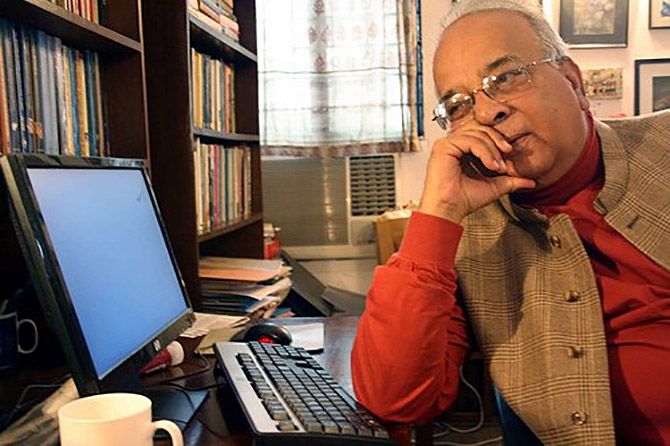
The AMU's Centre of Advanced Study in History has always paid least attention to Modern Indian History.
In his foreword to the revised edition of David Lelyveld's Aligarh's First Generation, Mushirul Hasan wrote about its obsessive confinement to Medieval Indian History, failing to produce adequate literature even on a subject like The Aligarh Movement, Sir Syed's biography.
He felt that in an era of vilifying and demonising Muslims, the big challenge before AMU's CAS in history was to come out with a huge quantum of quality researches on modern and contemporary history, so that the canards and myths being propagated by the evil forces could be effectively disproved not only at an academic level but also at the popular level.
He subsequently wrote long academic essays on other vexing questions of communalism and India's Partition, so much so that his research on this subject became mandatory references for historians across the globe.
The existing scholarship seemed to put most of the blame not only on the Muslim League but also on India's Muslims as a whole.
He published his essay on how the Congress -- buckling under majoritarian pressures not only from the Hindu Mahasabha but also from the leadership of the provincial and lower units of the Congress -- had squandered the opportunity to arrest Muslim alienation during the Congress ministries of 1937-1939.
His essay (in Economic and Political Weekly, December 27, 1986) on the Muslim mass contact campaign of the Congress made a critical evaluation of the theme and demonstrated how majoritarianism (besides the League's separatism, and British imperial roles), had no less a contribution in pushing India towards Partition.
Thus, the academic politics of fixing the guilt of Partition on Muslims started getting exposed.
By that time Mushirul's other EPW essays had already examined the evolution of communal politics in the Punjab and Bengal of the 1920s, and the nationalist, anti-British mobilisations of the Ulema, and other segments of Muslims.
When his alma mater, AMU, was vilified for having played a role in India's Partition he came out with a long essay (in the Indian Economic and Social History Review, 1985) on 'Nationalist and separatist trends in Aligarh, 1915-47' that gave a vivid account of the existence of nationalist, socialist, leftist and separatist trends on the campus.
He later developed this essay further to say how AMU played a role in integrating Muslims with India's secular democracy after Independence.
His essay, 'Recalling radical days in Aligarh' (in India International Centre Quarterly, 2002-2003) improved further on the topic to demonstrate the existence of 'radical' leftism on AMU campus in the 1960s.
This academic essay was part autobiographical as well.
Besides, he penned biographical accounts and primary documents pertaining to the likes of Mohammed Ali Jauhar, Mukhtar Ansari, etc.
Later he would turn to writing personal histories and biographies of Motilal and Jawaharlal Nehru (2009) and Mahatma Gandhi (Faith and Freedom, 2013).
Further segments of his life account are there in an interview, re-published in his collection of newspaper columns, Making Sense of History (2003).
He was particularly impressed with Professor Sarvepalli Gopal's historiography and prose.
He dedicated this book to Professor Gopal, with a couplet by Brij Narayan Chakbast,
He also felt that besides macro-history, accounts of micro-histories were equally necessary to highlight the contribution of Muslims in the making of India.
He therefore wrote an account of the Qasbas of Awadh Muslims and delved into the family histories/saga of the ilks of Kidwais, who rose to prominence through modern education in post-Partition India.
He found satirists like Wilayat Ali Bambooque, and subsequently also wrote an exclusive book, Wit and Humour in Colonial North India (2007).
Besides, he also published Moral Reckoning, dealing with Muslim intellectuals of the 19th century Delhi and their engagement with colonial modernity.
Amidst these pursuits, majoritarianism was rising in India.
He then brought out a book, Will Secular India Survive? (2004) in which he examined the role of secular political parties and of the Muslim leadership.
In short, his research provided a much needed perspective for studying India's Muslims in the colonial and post-Independence periods.
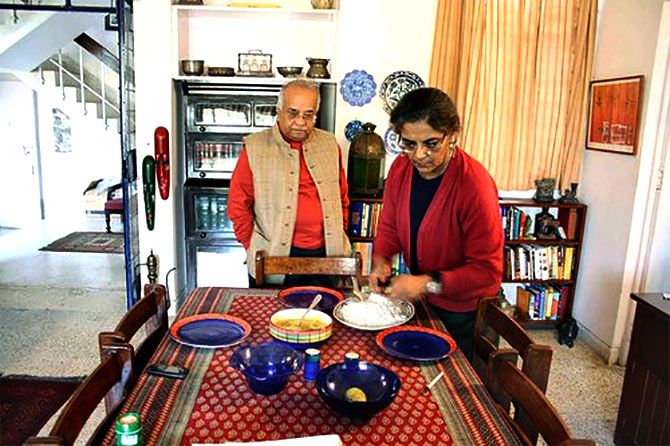
On becoming vice-chancellor of JMI (2004-2009), he drew promising and renowned scholars from accomplished universities across the globe as faculty.
The academic seminars he convened were packed with the who's who from the world of academia, media, bureaucracy, and diplomacy.
The visionary academician also succeeded in opening up so many special research centres within the campus; soon these centres developed teaching programmes, for which he made it a point to get sanctioned a large number of teaching and non-teaching positions and ensured that selection committees are held to fill up all such positions.
He also raised huge funds for aesthetically pleasing buildings, as JMI was reluctant to shed its image and appearance of an ordinary college.
He added a memorable and aesthetic skyline to the campus, with a distinctive architecture for each building.
World intellectuals and India's literary figures, besides local and national icons, were memorialised in JMI's architectures by centres being named after them.
In some cases, pencil-sketches of the architecture plan were suggested by Mushirul Hasan himself.
He realised the deficit in the history of India's premier educational institutions and collaborated with scholars to bring out an anthology, Knowledge, Power and Politics (1998), besides co-authoring an illustrative work on JMI's contribution to the national movement.
By this time he also paid attention to re-visiting Sir Syed's modernistic reformism and advocated such reformism through a critical obituary of Ali Mian Nadvi (1914-1999) that acknowledged the latter's scholarship and activism but dismissed his Islamist worldview.
Among public women, Turkey's Halide Edip (1885-1964) fascinated him.
A good number of these newly recruited faculty members are not only academically promising, quite a few of them also belong to the category of activists with progressive ideological orientations.
These very people not only succeeded in forming a group of teachers called Jamia Teachers Solidarity, which monitors the performance of the Jamia Teachers' Association, but also took up cases of 'fake encounters' in the name of 'Islamic terrorism' and are chasing the Delhi police in every possible way.
Simultaneously, they are not oblivious of minority communalism either.
These teachers engage themselves in transforming the political culture of the campus as well as in confronting the age-old vested interests of JMI.
As it usually happens, vested interests did launch smear campaigns against Mushirul Hasan.
However, he remained undaunted.
As VC, JMI, he earned laurels (and condemnation, too), for having defiantly stood up for his students implicated in a terror case.
He told Frontline (October 11-24, 2008), why he did what he did.
Despite all this, he faced a tremendous smear campaign on seeking another term as VC.
He then became the director general of National Archives of India, New Delhi, where too he demonstrated his vision and ability as an institution-builder, streamlining the record-keeping to help out researchers.
This was praised by Dinyar Patel, who was then working in NAI for his biography of Dadabhai Naoroji (1825-1917), the economic nationalist, scholar and parliamentarian.
For his extraordinary services within India as well as in Europe, Hasan earned laurels and honours, making India proud.
He received the highest French civilian award -- the Officer dans I' Ordre des Palmes Academiques (Officer of the Order of Academic Palms) -- from the French prime minister.
He was also conferred the Padma Shri by President A P J Abdul Kalam in 2007.
Sadly, despite all his huge accomplishments, when he came back from the NAI to the JMI and resumed teaching, close friends and colleagues hounded him out of JMI. His 'farewell' was unceremonious and painful.
Such a brave public intellectual and highly accomplished historian should have lived longer to help us build a better India.
The void his death has created is difficult to fill.
Our best tribute to the departed soul would be to emulate him in his research and writings and making interventions against all kinds of parochialism and chauvinism which our country today is face to face with, more menacingly now than ever before.
It is often complained that Mushirul Hasan did not mentor his own research scholars, even though it should also be appreciated that unlike some towering historians, he did not create a clique of his research students and indulge in favouritism to them in academic recruitments and promotions.
Moreover, he collaborated with a wide range of scholars in bringing out anthologies on various under-worked themes of modern Indian history.
I was not his student, but a student of his teacher Raj Kumar Trivedi, himself a student of Sarvepalli Gopal.
Mushir, however, did help me a lot in my research on colonial Bihar as well as in writing my monograph on Muzaffarpur Muslims.
He turned out to be one of the examiners of my PhD thesis.
I started my teaching career against his leave of vacancy in JMI in early 2000 and continued there for few years.
He and his colleagues supported and mentored me in several ways during the formative period of my academic career.
I shall remain immensely indebted to him.
Rest in peace, Mushir sahib!
Professor Mohammad Sajjad, who is at the Centre of Advanced Study in History, AMU, is the author of Muslim Politics in Bihar: Changing Contours and Contesting Colonialism and Separatism: Muslims of Muzaffarpur since 1857.
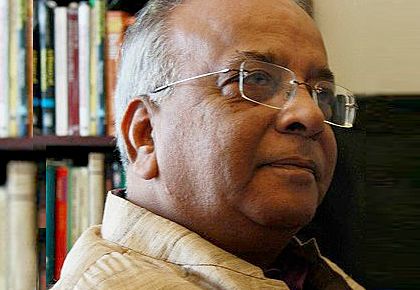











 © 2025
© 2025